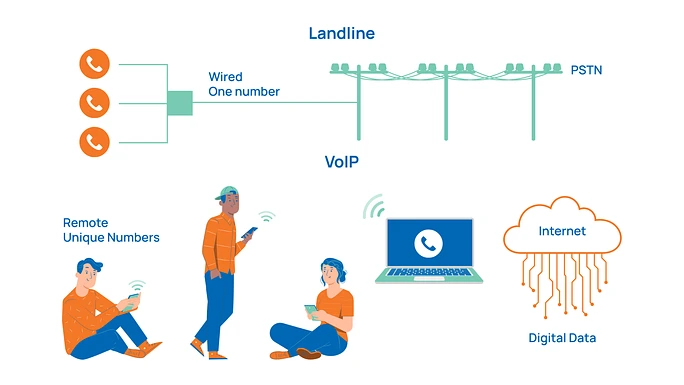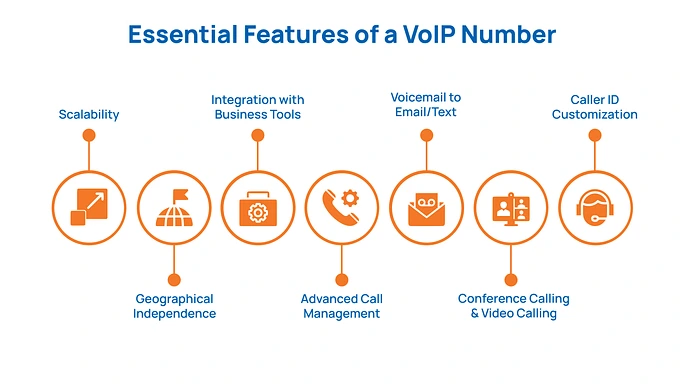Today, over 31% of businesses have switched to VoIP. The reason? Flexibility, lower costs, and better communication.
Businesses depended on landlines and PBX systems, which needed expensive setup, physical equipment, and regular maintenance. Growing a business meant installing new phone lines, buying costly hardware, and staying stuck in one location. This setup was inflexible and outdated, making it hard to adapt to changing business needs.
With a VoIP number, your business is no longer bound by wires, hardware, or office locations. Calls are handled over the internet, enabling seamless communication from anywhere, on any device. Scaling is instant, costs are lower, and integration with other business tools is effortless.
This blog will explore VoIP numbers, how they work, and why they’re a must-have for modern businesses.
Key Takeaways
- No More Physical Limitations: Unlike traditional landlines, VoIP numbers aren’t tied to a desk or location, allowing businesses to operate remotely and scale quickly.
- Multiple VoIP Number Types: Businesses can choose from local, toll-free, vanity, DID, virtual, international, and ported numbers to meet their communication needs.
- Cloud-Powered and Feature-Rich – VoIP systems offer call forwarding, voicemail-to-email, AI-powered routing, CRM integrations, and IVR automation to enhance customer service and efficiency.
- Scalability and Cost Savings—Adding or removing lines is instant, and call costs are lower, especially for international and long-distance communication.
- Getting Started Is Easy—Businesses can choose a VoIP provider, select a number type, configure settings, integrate with tools, and port existing numbers with minimal downtime.
|
What Is a VoIP Number?

A VoIP number is a phone number that works over the internet instead of a phone line. VoIP stands for Voice over Internet Protocol, which means your voice is converted into digital signals and transmitted online. This allows you to make and receive calls from any device connected to the internet, including smartphones, computers, or specialized VoIP phones.
How VoIP Numbers Differ from Landline and Mobile Numbers
- Location Flexibility – A VoIP number isn’t linked to a physical address. You can use it anywhere with an internet connection. On the other hand, landlines are fixed to a specific location, and mobile numbers rely on cellular networks.
- Device Compatibility – You can use a VoIP number on multiple devices (phone, laptop, tablet) without needing a SIM card. Landline numbers are tied to either a phone line or a mobile carrier.
- Call Costs—VoIP calls are usually cheaper, especially international and long-distance calls. Phone lines often charge based on location and duration.
For instance, you run a customer support team. With a landline number, your agents must sit at their desks to take calls. If they’re not in the office, they miss the call.
With a VoIP number, your agents can answer calls from anywhere, using their laptop or mobile app, whether at home, on the go, or overseas. The customer experience remains seamless, and your business stays connected no matter where your team is.
Type of VoIP Number
Type of VoIP Number
| Type of VoIP Number |
Description |
Example |
| Local Numbers |
A number linked to a specific geographic area, helping businesses establish a local presence even if they are not physically located there. |
A plumbing business in New York uses a VoIP number with a 212 area code to appear local to residents. |
| Toll-Free Numbers |
A number with an 800, 888, or similar area code that allows customers to call a business for free. |
A customer service helpline uses 1-800-HELP-NOW, allowing customers to call without paying. |
| Vanity Numbers |
A custom phone number that spells out a word or phrase related to a business, making it easier to remember. |
A flower shop uses 1-800-FLOWERS to make their number easy to remember. |
| Direct Inward Dialing (DID) Numbers |
A number assigned to a specific employee or department, allowing direct calls without going through a receptionist. |
A company assigns 555-123-4567 to its sales team, so clients can reach them directly without passing through the main line. |
| Virtual Numbers |
A flexible number not tied to any specific location or device allows calls to be forwarded anywhere. |
A freelancer working remotely uses a virtual number that rings on both their laptop and mobile phone. |
| International Numbers |
A local number in a foreign country that lets businesses establish a presence without a physical office. |
An e-commerce company sets up a local French number (+33-1-23-45-67-89) to serve its Paris-based customers. |
| Ported Numbers |
An existing phone number transferred from a traditional phone system or another VoIP provider to retain brand recognition. |
A law firm keeps its long-standing number when switching from a landline to VoIP to maintain client familiarity. |
How Does a VoIP Number Work?
Here’s how a VoIP works:
1. Internet-Based Calling
When you call using a VoIP number, your voice is turned into small digital packets and sent over the internet to the recipient. These packets are reassembled into sound at the other end, creating a real-time conversation. The process is fast and seamless as long as you have a stable internet connection.
2. Cloud-Based Hosting
Unlike conventional phone systems that require physical infrastructure like PBX (Private Branch Exchange) hardware, VoIP operates through cloud-based servers. This means you don’t need to maintain expensive hardware and can easily add or remove phone lines as your business grows. Since everything is stored in the cloud, updates, and maintenance are handled automatically by your VoIP provider.
3. Device Flexibility
With a VoIP number, you’re not limited to a single phone. You can use it on desktop computers and laptops (through softphone apps), smartphones and tablets (via VoIP apps), and VoIP-enabled desk phones. This flexibility allows you to take calls from anywhere in the office, remotely, or traveling.
4. Number Portability
One of VoIP's most significant advantages is that your phone number isn’t tied to a physical location. If you move offices or expand your business to different locations, you can keep the same VoIP number without disruption. This makes VoIP ideal for companies with remote teams or multiple offices.
VoIP calls are often powered by SIP (Session Initiation Protocol), a technology that helps establish and manage VoIP connections. SIP enables:
- Call setup and termination – It handles connecting and disconnecting calls.
- Multi-device support – SIP allows a single VoIP number to ring multiple devices simultaneously, ensuring no missed calls.
- Integration with video and messaging – It supports voice and video calls, text messaging, and conferencing.
Essential Features of a VoIP Number

Here are the essential features and how they benefit businesses:
1. Scalability
VoIP systems allow you to add or remove phone numbers based on your business needs. Whether hiring new employees, expanding to new markets, or downsizing, you can scale your phone system without installing new hardware or waiting for a service provider.
For example, a growing e-commerce company must onboard 10 new customer support agents. With VoIP, they can instantly assign virtual phone numbers to each agent without any additional infrastructure.
2. Geographical Independence
VoIP allows you to choose numbers from different regions, even if your business isn’t physically located there. This will enable you to establish a local presence in multiple markets without setting up offices in each location.
3. Integration with Business Tools
Modern businesses rely on software like Customer Relationship Management (CRM), helpdesk platforms, and collaboration tools. VoIP systems integrate with these tools, allowing automatic call logging in CRMs like Salesforce or HubSpot.
It enables click-to-call functionality directly from your CRM, and unified messaging connects voice, email, and chat. For example, a customer service representative can see past interactions with a client in the CRM before picking up a call, providing better support.
4. Advanced Call Management
Call forwarding redirects calls to other devices or employees, ensuring important calls are never missed. You can set up forwarding based on specific conditions, like time of day or caller ID. IVR (Interactive Voice Response) is an automated system that greets callers and routes them to the correct department.
Call routing helps to distribute calls based on agent availability, caller location, or predefined rules. For example, a law firm sets up an IVR system where callers press 1 for consultations, 2 for billing, and 3 for existing case updates, reducing the need for a receptionist.
5. Voicemail to Email/Text
VoIP systems can transcribe voicemail messages and send them as emails or text messages. This ensures you can quickly review the message without listening to a recording even if you miss a call. For example, a business owner in a meeting receives a voicemail transcription via email, allowing them to prioritize urgent requests.
6. Conference Calling & Video Calling
VoIP supports audio and video conferencing, enabling teams to collaborate from anywhere. Teams can conduct online discussions instead of setting up physical meetings, reducing travel costs and increasing efficiency.
7. Caller ID Customization
VoIP lets you customize the number or name displayed when making outbound calls. This is useful for branding and improving call response rates. For example, a support team sets their caller ID to display XYZ Tech Support so customers recognize the call and pick it up.
When Does Your Business Need a VoIP Number?
If your business still uses a traditional phone system, it’s essential to recognize the signs that it may be time to switch to a VoIP number. Here are the crucial indicators that your business needs a VoIP number:
1. Your Current Phone System Limits Productivity
Legacy phone systems don’t integrate well with modern business tools. If employees switch between multiple platforms to make or receive calls, workflows slow down. A VoIP system consolidates voice, video, and messaging into one platform, making communication seamless.
2. Your Business Needs Mobility
With more employees working remotely or on the go, a VoIP number ensures they stay connected without relying on a desk phone. Calls can be answered from any internet-connected device, whether in the office, at home, or while traveling.
3. Rising Costs of Conventional Phone Systems
Maintaining a traditional phone system involves high costs for equipment, maintenance, and call charges—especially for long-distance or international calls. VoIP reduces costs significantly by using the internet for communication, eliminating expensive landline fees.
4. You Need More Advanced Features
Your business may be held back by a phone system that lacks features like call forwarding, voicemail-to-email, video conferencing, or CRM integration. VoIP numbers have built-in advanced features that improve customer service and operational efficiency.
5. Your Current System Lacks Scalability
Adding new lines to a phone system can be expensive and time-consuming if your business grows. VoIP allows you to scale up or down quickly, adding new numbers instantly without hardware upgrades.
6. Your Customers Expect Faster Communication
Customers today expect businesses to be available across multiple channels. If your phone system can’t integrate with chat, email, or customer service software, response times suffer. VoIP connects with various business tools, improving communication and customer experience.
How to Get a VoIP Number for Your Business?
Here’s what you need to consider when getting a VoIP number for your business.
1. Choosing a VoIP Provider
Selecting the right VoIP provider ensures reliable service and smooth operations. You should evaluate:
- Pricing – Compare costs, including setup fees, monthly plans, and per-call charges.
- Features – Look for essential features like call forwarding, IVR, voicemail-to-email, and analytics.
- Reliability – Ensure the provider offers high uptime and clear voice quality with minimal disruptions.
- Integrations – Check if the VoIP service integrates with your existing CRM, helpdesk, or business tools.
At PerfectSoft.AI, you get a feature-rich VoIP solution designed for your contact center. It offers global redundancy, AI-driven call management, and seamless CRM integrations to enhance customer interactions.
2. Types of VoIP Numbers
VoIP providers offer different types of phone numbers to suit various business needs. Local numbers help establish a regional presence with familiar area codes, while toll-free numbers (e.g., 1-800) allow customers to call without charges.
3. Setup Process
Setting up a VoIP number is quick and does not require physical hardware. You can configure call settings, call forwarding, voicemail, and routing options. You can also integrate VoIP with business tools like your CRM, helpdesk, or communication platforms. Test your VoIP system. Ensure call quality, connectivity, and settings are correctly configured.
However, at PerfectSoft.AI we simplify the setup process, offering easy-to-configure VoIP solutions with AI-powered call handling, IVR automation, and seamless software integration.
4. Porting an Existing Number
If your business already has a phone number, you don’t have to change it. Most VoIP providers allow you to port (transfer) your existing number to their platform.
Confirm that your current number is portable. Submit a request to your new VoIP provider. You may need to share proof of ownership and service details. The process takes a few days, when your existing number remains active.
Utilize CCaaS Solutions for a Seamless Customer Experience
CCaaS solutions depend on an internet-based telephone to manage inbound and outbound calls. Instead of using traditional phone lines, VoIP numbers allow businesses to handle voice communication over the Internet, reducing costs and increasing flexibility. Here is how they help contact centers:
1. Omnichannel Integration
CCaaS platforms unify multiple communication channels, including VoIP calls, live chat, email, SMS, and social media messaging. This ensures that customer interactions remain seamless across different touchpoints.
2. Smart Call Routing & IVR Automation
VoIP numbers work within CCaaS systems to enable AI-driven call routing, ensuring customers reach the right agent based on skills, language, or past interactions. VoIP-powered IVR (Interactive Voice Response) solutions automate common queries and direct callers efficiently.
3. Scalability for Contact Centers
CCaaS platforms use VoIP numbers to add or remove agents instantly, allowing businesses to scale during peak seasons without infrastructure limitations. VoIP eliminates the need for physical phone lines, making remote agent deployment easy.
4. Cost Savings & Analytics
With VoIP-powered solutions, businesses save on long-distance and international call costs while using real-time analytics to monitor call performance, agent efficiency, and customer satisfaction.
Optimize Your Contact Center with VoIP for Clearer, Faster Communication

Managing customer interactions across multiple channels can be challenging, especially when there’s no centralized system. Agents struggle to maintain consistency without proper tracking, leading to fragmented communication and a poor customer experience.
PerfectSoft.AI solves this by providing a unified view of customer history, seamlessly integrating interactions from email, web chat, phone calls, and more into a single interface. Whether running a high-volume BPO, customer service team, or sales operation, PerfectSoft.AI enables you to connect effortlessly across all channels while maintaining crystal-clear voice communication.
Our Solutions Include:
Omnichannel Contact Center Software: Manage voice, SMS, email, social media, and live chat from a unified platform.
Telecom Voice Services: Ensure high-quality, secure, reliable voice connections, advanced VoIP, and global reach.
Why Choose PerfectSoft.AI?
- Seamless Integration: Connect with your existing CRM and business tools.
- Cost-Effective Solutions: Optimize operations without breaking the bank.
- Scalability & Flexibility – Easily scale your contact center operations.
- 24/7 Support: Get personalized, round-the-clock assistance whenever you need it.
Your contact center deserves technology that keeps you ahead. Let’s transform your customer interactions and voice communications today.
Get Started Today!  A VoIP number is a phone number that works over the internet instead of a phone line. VoIP stands for Voice over Internet Protocol, which means your voice is converted into digital signals and transmitted online. This allows you to make and receive calls from any device connected to the internet, including smartphones, computers, or specialized VoIP phones.
A VoIP number is a phone number that works over the internet instead of a phone line. VoIP stands for Voice over Internet Protocol, which means your voice is converted into digital signals and transmitted online. This allows you to make and receive calls from any device connected to the internet, including smartphones, computers, or specialized VoIP phones.
 Here are the essential features and how they benefit businesses:
Here are the essential features and how they benefit businesses:
 Managing customer interactions across multiple channels can be challenging, especially when there’s no centralized system. Agents struggle to maintain consistency without proper tracking, leading to fragmented communication and a poor customer experience.
PerfectSoft.AI solves this by providing a unified view of customer history, seamlessly integrating interactions from email, web chat, phone calls, and more into a single interface. Whether running a high-volume BPO, customer service team, or sales operation, PerfectSoft.AI enables you to connect effortlessly across all channels while maintaining crystal-clear voice communication.
Managing customer interactions across multiple channels can be challenging, especially when there’s no centralized system. Agents struggle to maintain consistency without proper tracking, leading to fragmented communication and a poor customer experience.
PerfectSoft.AI solves this by providing a unified view of customer history, seamlessly integrating interactions from email, web chat, phone calls, and more into a single interface. Whether running a high-volume BPO, customer service team, or sales operation, PerfectSoft.AI enables you to connect effortlessly across all channels while maintaining crystal-clear voice communication.


Comments